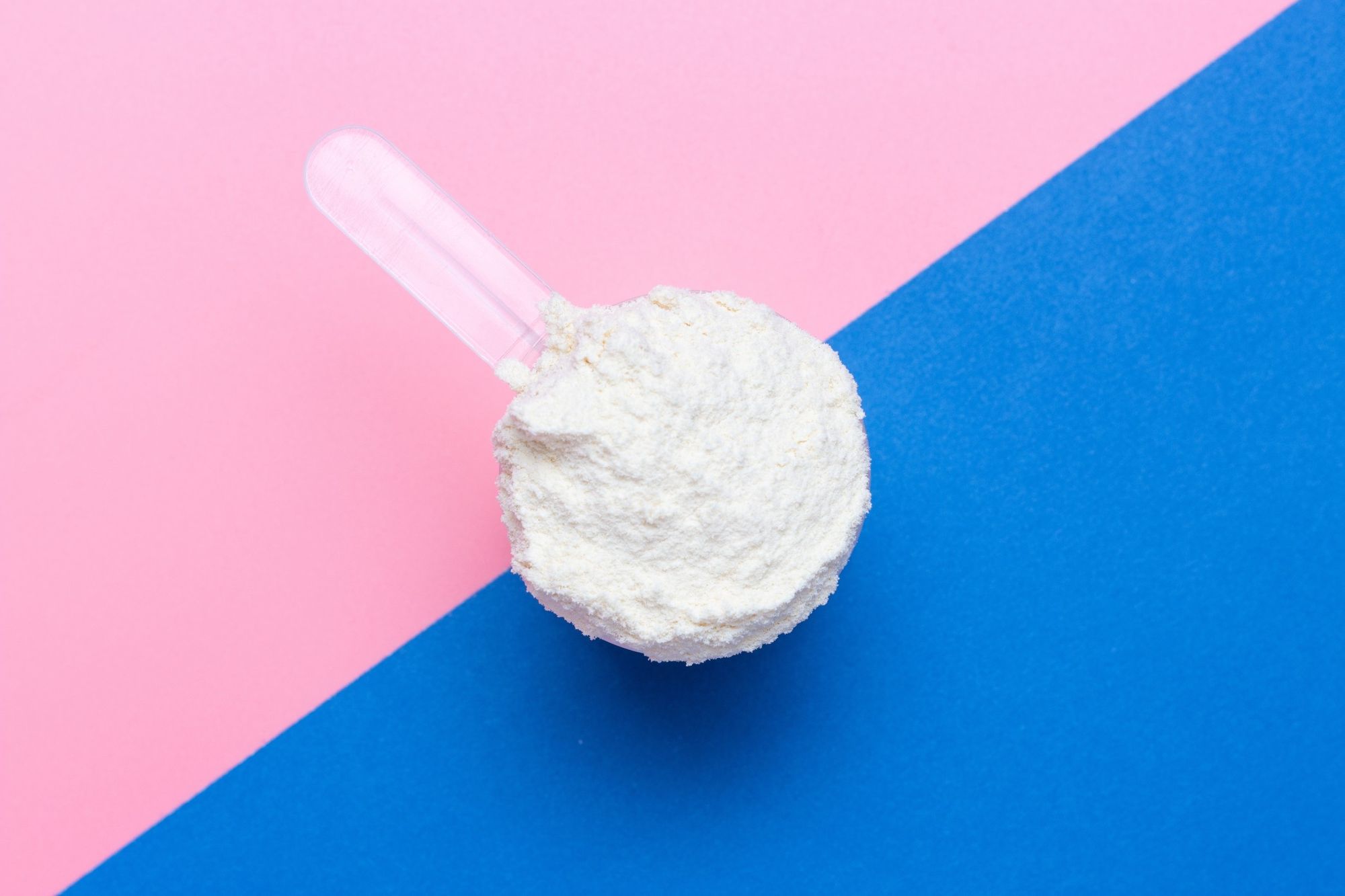4 Surprising Benefits of Creatine You Didn’t Know About
Creatine: only good for enhancing athletic performance? Nope. Here are 4 non-sports-related creatine benefits that'll see have you going, "Wha—?"

A creatine supplement helps your body regenerate ATP (i.e., energy) quicker during high-intensity physical activity, boosting your athletic performance — the “holy trinity” of speed, power, and strength — plus endurance.
But you know that already.
What you probably don’t know, however, is perhaps this: the benefits of creatine supplementation aren't just limited to the sports realm.
In this article, we cover 4 strictly non-sports benefits of creatine that’ll have you:
- Desperately searching for an online retailer who'd ship it to your doorstep ASAP (if you don't already have creatine on hand, that is) and
- Singing high praises about and recommending creatine to everyone you care about, like your mom, partner, and a select few colleagues (no explanation necessary)
#1: It’s a nootropic
Noo … wha—?
For the uninitiated, nootropics refer to substances (natural or synthetic) that positively influence mental performance, such as focus, learning, clarity, alertness, logical reasoning, and memory recall.
And creatine is one? A nootropic?
Mm-hmm, that’s right. But why? Well, that’s because your brain is a huge ATP drainer. And by huge, we mean it.
To put that into perspective, an individual with a total daily energy expenditure (TDEE) of 2,000 calories would have 400 calories — possibly more than you'd burn running for 20 minutes on the treadmill! — allocated to the brain alone.
So, bottom line?
By ensuring your brain has pretty much a “steady supply” of replenishing ATP, creatine helps you stay sharp and focused throughout your day.
In fact, according to a 2003 study published in the Proceedings of the Royal Society B: Biological Sciences, participants who adhered to a vegetarian diet* experienced a 20% to 50% improvement in specific memory and intelligence test scores after 6 weeks of creatine supplementation.
#2: Lowers your risk of cognitive disorders
As if enhancing cognitive functions wasn’t impressive enough, studies (both animal and preliminary human studies) also suggest that creatine supplementation could help you ward off neurological disorders, such as ...
Animal studies have also suggested that creatine may improve thinking in Alzheimer’s disease, the most common type of dementia.
#3: May improve fertility
In the midst of #TTC?
Yes, creatine could help with your, *ahem* performance and endurance during those baby-making sessions — but that’s not all.
Because … guess who (or what, instead) needs enough energy to survive the harsh expedition through the female reproductive tract? That's right. Those lil’ sperms. And, as it turns out, these fighters contain and make use of creatine to generate energy that fuels:
- Movement, so they get to the egg, and
- Conception (the lucky sperm need to penetrate and fuse with the egg), and
- Other metabolic functions
In fact, research often finds an association between low creatine levels and poor sperm count and/or motility.
Meaning?
All hopeful-fathers-to-be should probably consider creatine supplementation a crucial part of their “paternal preconception diet”.
Oh, and if you’re wondering whether you should continue to work out while #TTC:

#4: May lower blood sugar levels
While you don't have to get all — pardon the language — anal about managing your blood glucose levels, ensuring they fall within the "healthy range" most of the time is still a good idea.
How?
Once again, no. Assuming you go for regular health check-ups and know you don't have diabetes or pre-diabetes, you don't have to prick your fingers or buy those fancy continuous glucose monitors (CGMs).
Instead, it may appear all you need is some creatine.
Wondering why?
It seems creatine helps increase the function of glucose transporter type 4 (GLUT-4), which, as its name suggests, is responsible for bringing blood sugar into your muscles — lowering blood glucose.
How to use creatine (dosage, frequency, cycling, etc.)
Before you go off thinking creatine is a do-it-all “wonder drug”, here are a few disclaimers.
- You can get creatine through your diet: If you eat animal foods. Red meat and fish, in particular, are packed with creatine. So, remember how we added that tiny asterisk (*) mentioning individuals following a vegetarian diet experienced an improvement in mental performance post-creatine supplementation? If you eat plenty of red meat and fish, you’d likely have a “good” baseline of creatine levels. Creatine supplementation may not give you the equivalent cognitive boost as someone on a plant-based diet — who has a very low baseline level of creatine — would. That’s not to put you off creatine supplementation in any way; it’s just something worth keeping in mind.
- Animal studies are not the same as human studies: Just because creatine has been found to prevent a drop in dopamine production in mice with Parkinson’s doesn’t mean it’ll do the same for humans with Parkinson’s. We still need a lot more research.
This bears repeating: the above isn’t to say you should skip creatine supplementation.
Even if you eat animal-based foods, you'll unlikely get the amounts you need to fully saturate your muscles through your diet. Also, creatine is an incredibly well-studied supplement with an impressive safety and tolerability profile.
Point being? You’ll most likely benefit from creatine supplementation — if not the benefits mentioned above, then athletic improvements at the very least.
And if you’re wondering how to use creatine …


Feel excited about your workouts again with GymStreak
Psst: been searching high and low for that spark you felt when you first started working out?
We’re no psychic, but we have this feeling you might just find it in GymStreak, the AI-powered workout tracker that’ll personalize your training and nutrition to your specific goals and needs.
So, you don't have to worry about planning — just doing. Ahh, what a relief.
If you're already feeling the beginning of that light, excited, tingling sensation in your soul, you know what to do: download GymStreak.
Workout Programming + Nutrition Tracking, Off Your Hands
*sigh of relief* We'll guide you through it all — step-by-step. Just download the app, and you'll be making progress toward your dream body like never before.
References
Gualano, B., et al. “Effects of Creatine Supplementation on Glucose Tolerance and Insulin Sensitivity in Sedentary Healthy Males Undergoing Aerobic Training.” Amino Acids, vol. 34, no. 2, Feb. 2008, pp. 245–50. PubMed, https://doi.org/10.1007/s00726-007-0508-1.
Matthews, R. T., et al. “Creatine and Cyclocreatine Attenuate MPTP Neurotoxicity.” Experimental Neurology, vol. 157, no. 1, May 1999, pp. 142–49. PubMed, https://doi.org/10.1006/exnr.1999.7049.
Nelson, A. G., et al. “Muscle Glycogen Supercompensation Is Enhanced by Prior Creatine Supplementation.” Medicine and Science in Sports and Exercise, vol. 33, no. 7, July 2001, pp. 1096–100. PubMed, https://doi.org/10.1097/00005768-200107000-00005.
Ostojic, Sergej M., et al. “Creatine as a Promising Component of Paternal Preconception Diet.” Nutrients, vol. 14, no. 3, Jan. 2022, p. 586. PubMed Central, https://doi.org/10.3390/nu14030586.
Rae, Caroline, et al. “Oral Creatine Monohydrate Supplementation Improves Brain Performance: A Double-Blind, Placebo-Controlled, Cross-over Trial.” Proceedings of the Royal Society B: Biological Sciences, vol. 270, no. 1529, Oct. 2003, pp. 2147–50. PubMed Central, https://doi.org/10.1098/rspb.2003.2492.
Raichle, Marcus E., and Debra A. Gusnard. “Appraising the Brain’s Energy Budget.” Proceedings of the National Academy of Sciences, vol. 99, no. 16, Aug. 2002, pp. 10237–39. pnas.org (Atypon), https://doi.org/10.1073/pnas.172399499.
Rosas, Herminia D., et al. “PRECREST: A Phase II Prevention and Biomarker Trial of Creatine in at-Risk Huntington Disease.” Neurology, vol. 82, no. 10, Mar. 2014, pp. 850–57. n.neurology.org, https://doi.org/10.1212/WNL.0000000000000187.
Taylor, Matthew. Creatine to Augment Bioenergetics in Alzheimer’s. Clinical trial registration, NCT05383833, clinicaltrials.gov, 9 Jan. 2023. clinicaltrials.gov, https://clinicaltrials.gov/study/NCT05383833.
Umehara, Takashi, et al. “Creatine Enhances the Duration of Sperm Capacitation: A Novel Factor for Improving in Vitro Fertilization with Small Numbers of Sperm.” Human Reproduction, vol. 33, no. 6, June 2018, pp. 1117–29. Silverchair, https://doi.org/10.1093/humrep/dey081.


